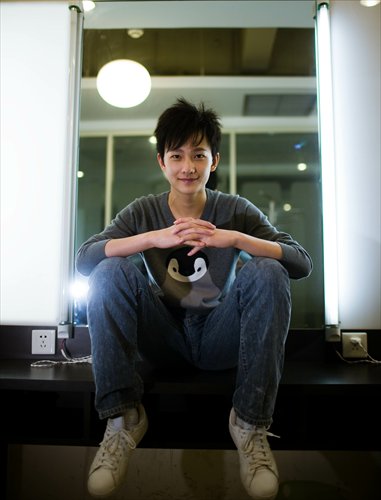‘Come to my bowl’
Chinese women hunger for fresh-looking boys and young men

Some experts say that the "little fresh meat" phenomenon represents a positive step for the empowerment of women. Photo: Li Hao/GT
On the first day a new colleague came to work in her office, Violet Wang could barely hide her excitement. The 24-year-old office clerk said that like many women in the office, they had been expecting a new face for a long time, and they were thrilled to have a good-looking man in the workplace. "He's thin and tall, and looks good in white shirts," said Wang. "His skin is not very good, but he still looks young and innocent like a college student."
The women in the office privately referred to him as "little fresh meat," a popular meme referring to good-looking young men, usually between the age of 12 and 25. A search using China's largest search engine Baidu with the key word "little fresh meat" yields more than 11 million results, with people talking about not only the young celebrities, but also fresh-faced young men discovered by Web users, and new faces people know from their own lives.
While some enjoy themselves in the visual feast of good-looking men, some find the label offensive. Experts said the phenomenon helps people read into how Chinese women's aesthetic appreciation of men has evolved through the years, and reflects changes in China's social structure.
A spreading cultural phenomenon
Wang said she is no stranger to how Web users are crazy about the freshest batch of "little fresh meat." The popularity of the little fresh meat on the Chinese Internet usually happens fast, sometimes just overnight.
One example would be a video posted online that went wildly popular in February. The video is of a man singing in front of a camera and another good-looking young man in the background nodding and smiling along on the upper berth of a bunk bed. The latter was affectionately dubbed the "upper bunk brother" by Chinese Web users. Web users unveiled his personal information in no time, revealing that he is a student pilot named Xing Yuanbo, the Xinhua News Agency reported. Xing soon gained 670,000 followers on his Sina Weibo account. The original post has been forwarded more than 46,000 times and commented on more than 23,000 times, with many women young and old saying, "Come to my bowl, you little fresh meat! "
"To me, [the definition of] little fresh meat means being young, with bouncy and collagen-filled skin," said Stephanie Zhong, 31, a senior fashion editor for Beijing-based LifeStyle magazine. "[They] also need to show a hint of immaturity and tenderness to be called little fresh meat."
"[They don't necessarily] have to be muscular, but their face should be fresh," said Zhong, who mainly works in photography, shooting celebrities and fashion icons for the magazine. Zhong has shot several features with the theme of little fresh meat in the past year.
During her work, Zhong noticed that many pop stars and actors with a little fresh meat image will highlight this image with clothing choices, such as white shirts. "Men's fashion photography is not for men, but for women."
Having witnessed the scene of many middle-aged fans cheering and screaming for their beloved TFBoys, a teen pop band, Zhong said there's no denying that little fresh meat is hot at the moment. "I am not sure, but it seems that in my experience, women older than 40 and homosexual men are especially crazy about [little fresh meat]."
Although personally preferring men who are more sophisticated, like 55-year-old British actor Colin Firth, Zhong said the attention that little fresh meat guys receive has recently overtaken the attention given to dashu, that literally translates as "old uncles," a term referring to mature men.
"The types of men that women like go to two extremes. Some women like the rugged kind, while others like those with delicate skin who take good care of their looks, like the pop stars from Japan and South Korea," she said. "Unlike Western women, who attach much importance to a man's body shape and muscles, Chinese women tend to care more about the face."
The Daily Mail reported that global sales for men's skincare products has grown 20 percent yearly from 2008 to 2013. The Yonhap News Agency reported in March that men in South Korea each month use 13.3 make-up and skincare products including toner and facial masks, compared to 27.4 products for women.
Evolution of beefcake
Women's taste in men has been evolving in the past decades. In the 1980s, actor Zhu Shimao, represented the most popular look, with stern, tough face lines, bushy eyebrows, big eyes, and a patriotic temperament, according to a 2014 iRead Weekly article. Japanese actor Ken Takakura's popularity in China in the 1980s greatly influenced women's aesthetic standards. He represented cool men with chiseled features wearing windbreakers. Since the 2000s -- "flower guys," fragile, beautiful and nonthreatening -- have become the new favorite.
"Of course women have the rights to 'consume' men," said Zhong. "Although China is by nature a male dominated society, the main consumers of lifestyle media are still women. So the consumption of male [appearance] is something that would just naturally fall into place."
Li Yinhe, an eminent sociologist, told the Beijing News that the little fresh meat phenomenon is a good sign for the empowerment of women. "In the past, women were an object of appreciation, and now it's the men's turn. This is a big improvement."
Lü Pin, a feminist and media worker, agreed. "I think the phrase is a symbol for the possibility of diversification. In the past the mainstream was old men [dating] young women, but now matches of people of different ages are being accepted."


The "little fresh meat" phenomenon is being driven by middle-aged women with money. Photos: Li Hao/GT
Blowback
Some men are not happy with the term. A 27-year-old website programmer surnamed Lin told Metropolitan that he finds the word "demeaning" and would never allow anybody to call him a piece of little fresh meat. "It reminds me of the meat in a market waiting to be selected by customers. It's terrible and makes people feel strange," said Lin.
"Many men would take it as a compliment. But women who use this term don't even try to hide the fact that they just want the men's bodies, and their desires of consumption," he said. Lin said it's interesting that in his circle, women rarely use the word "little fresh meat" in front of the young men they like so much.
Chinese Swimmer Ning Zetao, 22, said that he wouldn't want to be called a piece of little fresh meat, the Guangzhou Daily reported. "I don't like this nametag," he said. Ning's mother also said that she is quite traditional, and she felt angry about how the media would use phrases such as "little fresh meat" or "national husband" to describe her son, eastday.com reported.
The use and prevalence of meme words like "little fresh meat", "gaofushuai" (tall, rich and handsome men), "nuannan" (warm guys, men with mild tempers), "jingji shiyong" (economically practical men) and others are seen by experts as men being "categorized" on a scale of their values by women.
In an article published in the Oriental Outlook magazine, Mitose Noriko, author and columnist with the Japanese-language magazine People's China, said, "It seems like Chinese society has entered a stage where women are superior to men. "
"How Chinese women see men is becoming more diversified and practical too," he wrote.
The new middle-class women
"The significance of this cultural phenomenon is more important in a social and economical sense than in an aesthetic way," said Wu Qiang, associate professor in politics working at the School of Social Science at Tsinghua University. "[The focus of attention is] changing from dashu to little fresh meat, indicating a change of the subject of discourse. People talking about little fresh meat are usually women between 30 and 45 years old."
"They have time to engage in social interaction on the Internet, and money to spend," said Wu. "The number of those women from the middle class is growing and they are having a bigger voice in society, leading to new words emerging. The group is large enough for the society to recognize their existence and get interested in what they think of men, society and other subjects."
Wu stressed that the "little fresh meat" trend may seem to be based on age, but actually, it revealed something about class. "Modern Chinese society shows features of a mature industrial society. Power and money are going to the older generations, along with the increasing social inequality and social stratification, while the young are becoming comparatively poorer."
Since little fresh meat refers to young working people, who have just graduated from college and have not developed careers, Wu said, older women dating younger men is not an issue of changing aesthetic standards, but people with money commodifying people without money - an indication of a class gap.